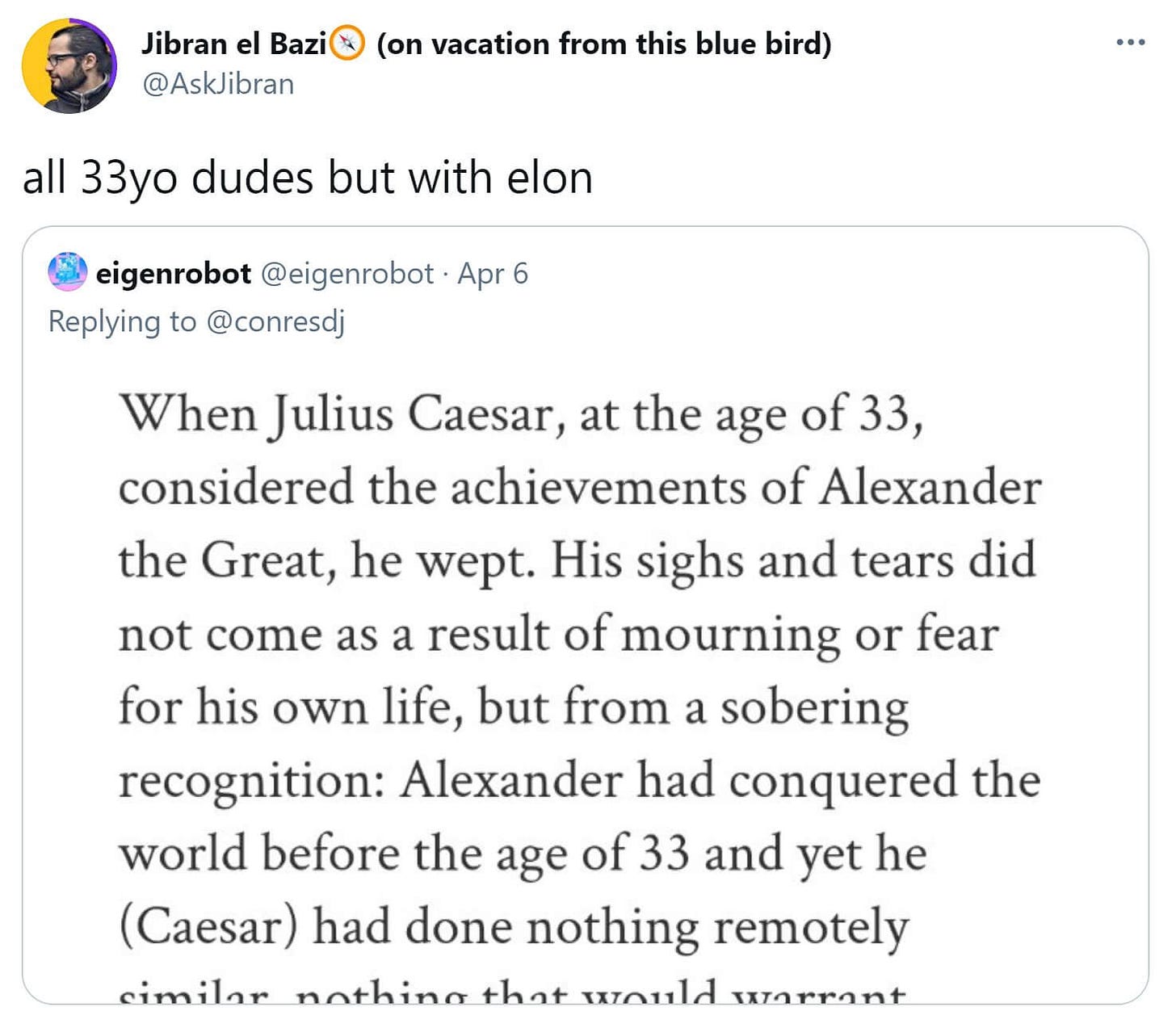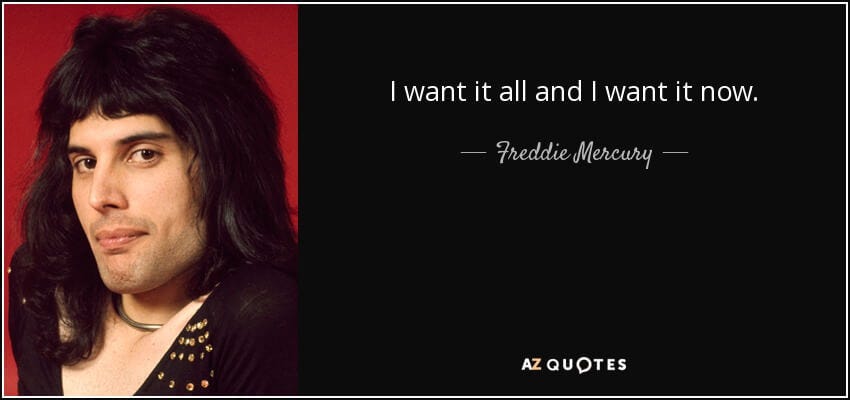What you say in your mind: "Holy Shitballs! Andrew just doubled his list of subscribers in two months!... I'd bet he used some stupid, unethical tactic."
What you actually feel: "I want more subscribers too! Why can't I get more subscribers? What is he doing that I'm not? How can I find out his trick?... But I don't want to learn from him, because it means he's 'above' me. Argh! I should be better than him!"
Maybe the number of newsletter subscribers is not something you measure; perhaps it's the car you have vs. your neighbors'. Or a colleague is outperforming you.
In any case, you're comparing yourself, which will regularly result in frustration or feeling better than someone else (and a possible feeling of guilt because of feeling better than your peers).
It's a human thing, so don't feel guilty about it. Ok?
But it's god-awfully annoying, though, isn't it? It keeps you from enjoying the personal "wins" that you do have. And suppose you're really "successful" (however you define that). In that case, you'll still be comparing yourself, but you'll just find "the next level" of peers to compare yourself to. I mean, we can't all be Elon Musk…
I'm super guilty of this "comparing," by the way. I've made many choices in my life as a consequence of comparing myself to others. Even worse: I made decisions based on what I thought others would think was a good choice to make.
I'm still working through some of these regrets.
So, how do you stop comparing yourself to others, then? Well, you can look up the top 10 (other) articles in a search engine about this, and they'll all give you a list of this kind:
"9 proven ways to stop comparing yourself to others."
They're all the same, really. The methods they put forth may work for a bit. But not long-term.
Why will you fall back to comparing yourself to others?
Because the methods don't discuss the root cause of why you're comparing yourself to others.
In this article, I'll tell you both why you compare yourself to others and the best way you can stop doing so. Hint: the answer is in the title.
Play your own game.
You Have Desires
You've probably heard it on the radio at some point: "I want it all, I want it now." - Queen, the outstanding band, sang about desire often. It's human nature to want things. But do you also know where your desires come from?
Most, if not all, your desires come from the fact that your peers have or want something. The people you regard as your peers, those close to you in the hierarchy (as you define it), are the ones you compare yourself to.
You want what they have (and preferably a little more). So that you fit next to them or a little above them in the hierarchy.
To use the example from the intro above: I'm comparing myself a lot to other content creators that also write a newsletter, especially the ones that are "close" to me in numbers, reach, or topics I write about. I'm not comparing myself to James Clear with his 500k+ subscribers, for example.
Now ask yourself, what is it that you desire? And why do you desire it? (You don't have to answer this right away, but make a note to think about it consciously, at least.)
SIDENOTE
Ok, here's the following fact (apart from everything else that I'm going to tell you about how you can stop comparing yourself to others): You have no idea what sacrifices someone had to make, by choice or by circumstance, that enabled them to get what they got (that you also desire).
Thus, ask yourself, are you willing to make the same sacrifices your peers made to get those outcomes?
One of the sacrifices that I am conscious of is that many of the newsletter writers that I compare myself to don't have children and/or are single. This permits those writers to have more time to write, go further with less income, etc. But they may miss the joy of a family (or not).
The irony is, maybe they're even comparing themselves to me as it relates to having a family! *mind-blown emoji*
In any case, I wouldn't want to trade places.
Anyway, I hope you don't feel too bad about realizing most (or all) your desires come from you comparing yourself to peers, because in the next section, I'm going to tell you that you're an impostor…
Your Desire Makes You An Imposter
You say what?!
Yes, I'm saying that when you desire something, you're an impostor. In the sense that you want something which you do not already have, but you do, in fact, act like you have "it." You signal, through your manners, language, etc., as if you have "it."
Why are you signaling like you have" it?"
Well, isn't it obvious? You are clearly not going to signal that you're trying really hard to attain the thing that your peers already have.
Trying hard means you're "lower" on the rung in the hierarchy.
Trying too hard shows that you're an impostor. It will wholly and utterly expose you as not part of the in-group (even though most others in the group are also imposters).
Fucked up, right? And worse than feeling an impostor (if you're conscious of it, which most people are not) is that actual conflict can emerge from this behavior.
Conflict Emerges From Our Desires
The enemy of my enemy is my friend...and also my enemy…
Ok, your peers, the individuals you regard as part of your group, also vie for the same things you desire.
Using the above example, you might say, "More newsletter subscribers, right?"
And I'd say, "No."
"Then what?!" you ask.
Let's look at what those newsletter subscribers are a proxy for in the in-group of newsletter writers.
The number of subscribers says something about the success of the writer.
This metric for success, then, places the writer in a particular place in the group's hierarchy.
What is this social currency in a group?
It is recognition, attention, and admiration.
It is this social capital that we all truly desire.
But there is a limited amount of it going around in each group. So you and your peers "fight" for the same currency.
But not directly; that would be social suicide.
Suppose you'd say you're fighting for the attention, recognition, and admiration of your peers (and those lower than you in the hierarchy). In that case, you'd be saying you don't have it yet. Hence, going back to the impostor label.
Thus, how do you fight over this social capital?
You start fighting over the small things because you cannot fight over the big stuff. You are too close to each other in what you desire to fight over the big stuff.
If you'd fight over big things, you'd both belong to different groups. And belonging to different groups defeats the purpose of the fighting because you wouldn't compete over the same social capital. Oh, the irony!
So the closer you are to someone, the smaller the things you fight about are.
One of the most discussed points (read: Twitter fights) newsletter writers argue about is which newsletter software is the best. We fight about it like it's a matter of life and death…
Fights about newsletter software go like this:
Writer A: "Convertkit is better."
Writer B: "No, Emailoctopus is better."
*back and forth more*
Writer A: "Ok, but at least don't use Mailchimp."
Writer B: "No, of course not, they suck at X."
See if you can find the scapegoat.
The fights usually end in the same way national or tribal disputes end: by invoking a scapegoat.
A scapegoat is an individual, group, or system (can be almost anything, really) that acts as a lightning rod. In Nazi Germany, the scapegoats were the Jews. In recent global disputes, it arguably is COVID-19 (probably better than having a group of people as a scapegoat).
You might ask now: Why are they (the peers within a group) not at each other's necks all the time?
Well, you also admire or even love your peers. Your desires are the same, which means they indirectly validate your desires. You truly admire other writers for their beautiful work (even though you can also feel envious at the same time).
How nice would it be if you could admire the work of your peers but not feel envious or resentful?
How awesome of a feeling would it be that you could fully support others with your words and actions, without thinking that part of the compliments you give are untrue?
Well, that's possible. Or else I wouldn't have written this article and instead just pointed you to one of those "how to stop comparing yourself" listicles I talked about earlier.
You stop comparing yourself to others by playing your own game.
Don't compete; instead, play your own game
You've read this long, and now you're probably saying, "Jibran, shit, this is an awfully long lead-up to making a point, man…"
Sure, it was 1524 words, to be precise.
But I'd tell you that you just received an excellent summary of one of the most exciting and practically applicable theories of human desire. (A large part of what I wrote up until this point is based on late René Girard's theory of Mimetics.)
Now that you understand this, you can always figure out what the genuine desire is that you have vs. the ones you have because of your peers.
In a sense, all you have read above gives you the power to start playing your own game.
What is "playing your own game?"
It is pursuing a desire that you do not base on your peers' recognition, admiration, and attention, but on something beyond that.
When you play your own game, you don't compare yourself to others, but you compare yourself to yourself.
Instead of looking to others, you start asking questions of yourself:
Have you improved vs. your past self?
What will your future self think of what you are doing now?
When you pursue a desire through the above lens, it empowers you. You have control over and responsibility for your life. Achieving your desires is within your control. There is no need for outside recognition, and thus it negates conflict with your peers based on envy. (No (Twitter) violence or scapegoating necessary.)
So, what would you pursue if it weren't for the social capital (or monetary gains)?
For many, this is a difficult question to answer. And you may go through different versions of an answer (I certainly have!).
But one thing that you need for finding your true desires, your Purpose, is to seek the truth.
Seek Your Truth
Ok, let's summarize what we know about how to stop comparing yourself to others into two points:
You know, most of your desires probably come from external sources (your peers).
You know that you must play your own game. I.e., find (a combination of) desires you internally want.
The third step is how you're going to find this true desire.
Finding what you truly want in life is no small feat. It's not without good reason that I write about this on my website and in my newsletter. (I highly recommend you check out the Purpose Framework I made if you want to take action towards this goal.)
One important thing in finding your truth, which relates to comparing yourself to others, is that you shouldn't look to others to find what you really want. If you do, you'll just end up where we started, in a constant struggle for the same thing, social capital.
Finding and pursuing your purpose is playing your own game, and it is one of the best decisions you can make in your life. For it enables you to lead a life without comparing yourself to others. It allows you to pave a path that is your own.
Yes, you may cross paths with others, and they might even think you are a peer (and compare themselves to you). But if you continue your route based on your truth, it doesn't matter what other people think.
You can be content almost every day in comparing yourself only to yourself.
If you enjoyed this article, consider sharing it with friends or subscribing if you haven’t already.
Sincerely,
Jibran





